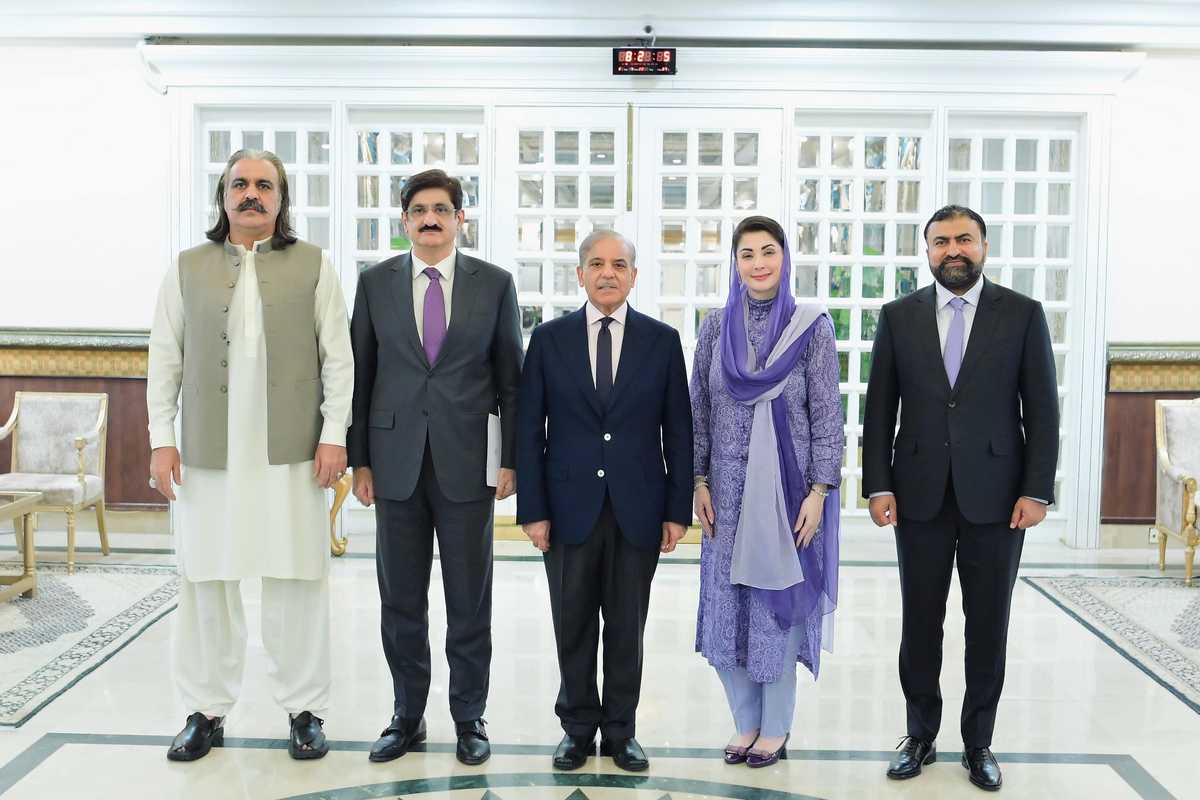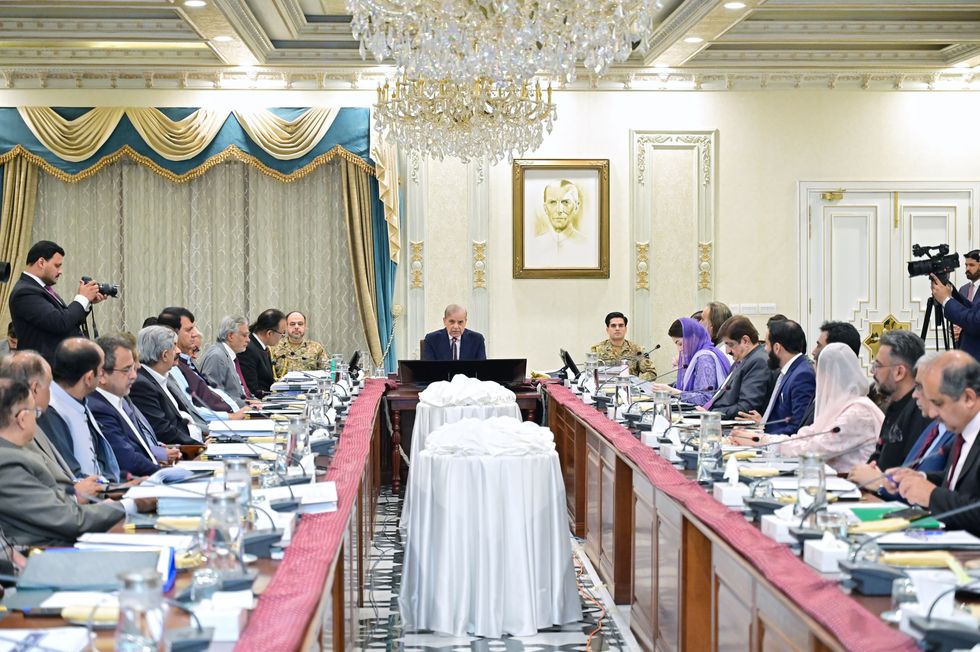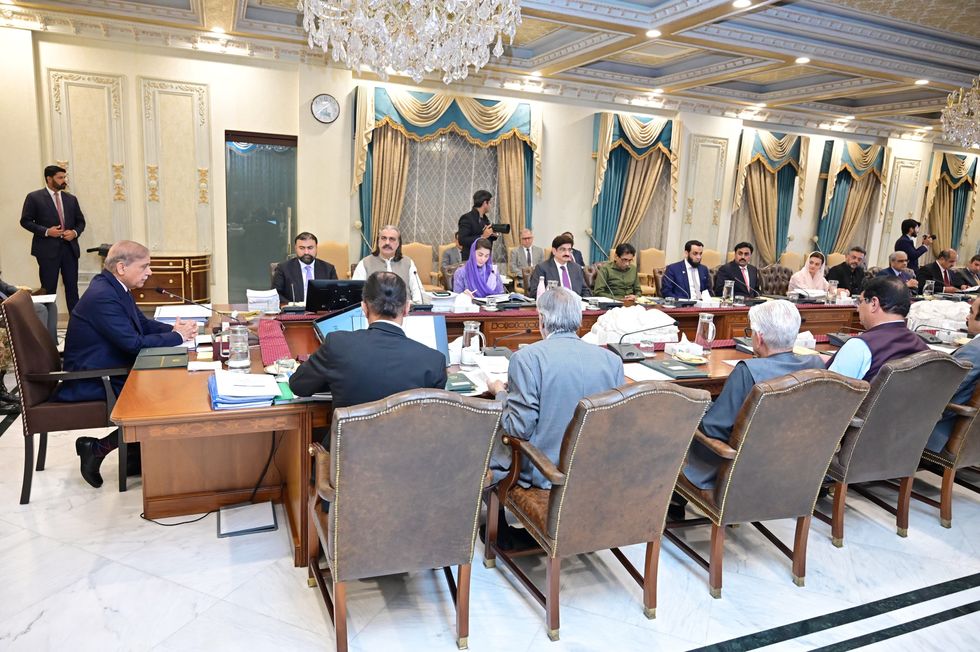Pakistan freezes controversial canal projects amid water-sharing dispute
Council of Common Interests moves to ease tensions between Punjab and Sindh; pledges no new canals without consensus
News Desk
The News Desk provides timely and factual coverage of national and international events, with an emphasis on accuracy and clarity.

Prime Minister Shehbaz Sharif with all four chief ministers before attending the CCI meeting in Islamabad on Monday, April 28, 2025.
PID
Pakistan’s top constitutional forum has frozen plans for new canals amid a growing dispute over water-sharing between the provinces of Punjab and Sindh.
Prime Minister Shehbaz Sharif chaired an emergency meeting of the Council of Common Interests (CCI) at the Prime Minister’s House on Monday, according to an official statement.
The CCI endorsed a federal government decision not to move forward with any new canal projects without unanimous agreement among the provinces.
“No new canals will be built without mutual understanding,” the statement said. The federal government is engaging all provincial governments to chart a long-term, consensus-based roadmap for agricultural development and water management across Pakistan.
Water rights of the provinces are protected under the 1991 Water Apportionment Accord and the 2018 National Water Policy, the council noted.
To ease tensions and address concerns, the CCI announced the formation of a committee with representation from the federal and provincial governments. The committee will propose solutions for Pakistan’s long-term agricultural and water needs, aligned with the two consensus documents.

"Water is one of the most precious commodities," the statement said, stressing the need for disputes to be resolved amicably through mutual understanding.
Following the discussions, the CCI decided to return a provisional approval granted earlier this year for the construction of new canals. It also withdrew a water availability certificate issued by the Indus River System Authority (IRSA) in January.
The Planning Division and IRSA were directed to ensure full consultation with all stakeholders before proceeding with any future projects.
The emergency session took place amid protests that have blocked Pakistan’s National Highway, paralyzing the movement of goods between Sindh, Punjab, and beyond.
Protesters have remained on the streets despite repeated assurances that no new canals will be constructed on the Indus River without full provincial agreement.
Political rift eases
The dispute had sparked tensions within Pakistan’s ruling coalition, pitting Sharif’s Pakistan Muslim League-Nawaz (PML-N), which governs Punjab, against the Pakistan People's Party (PPP), which controls Sindh.
Relations improved last week after PPP Chairman Bilawal Bhutto Zardari met with Sharif and pressed for a CCI meeting. Following the meeting, Sharif pledged to hold consultations on canal projects and not move forward without consensus.
Sharif also stressed the need for provincial unity amid heightened regional tensions, including the Kashmir attack and India’s recent suspension of the Indus Waters Treaty.
Originally set for May 2, the CCI meeting was brought forward to April 28 at Sindh’s request, Sindh Information Minister Sharjeel Inam Memon confirmed. Sindh Chief Minister Syed Murad Ali Shah attended to represent the province.
Controversial canal plans
The federal government’s plans included six new canals: five on the Indus River and one on the Sutlej River.
The proposed projects included the Rainee Canal and Thar Canal in Sindh, the Kacchi Canal in Balochistan, the Chashma Right Bank Canal in Khyber Pakhtunkhwa, and the Cholistan Canal and Greater Thal Canal in Punjab.
Three of these projects—the Rainee, Kacchi, and Chashma Right Bank canals—have been under construction since before the era of General Pervez Musharraf in the early 2000s. They have long drawn criticism from water experts in Sindh.
These canal projects are now part of the Pakistan Green Initiative, aimed at expanding corporate farming nationwide.

Under the 1991 Indus River System Accord, any new irrigation project must be approved by IRSA. Earlier this year, IRSA issued a certificate clearing the way for the Cholistan Canal. However, Sindh’s representative to IRSA, Ehsan Laghari, opposed the decision, warning that it could harm Sindh’s water rights.
Punjab argues that the Cholistan Canal would use its existing water share. But Sindh says Punjab has not explained which areas would sacrifice water to supply the new project.
This uncertainty has fueled fears in Sindh that water intended for their province could be diverted to irrigate new farmland in Cholistan.
Experts from Sindh have warned that further canal construction could reduce freshwater flows to the sea, devastating the province’s already fragile delta and coastal communities.
Sindh CM hails decision, thanks Shehbaz and Bilawal
Speaking to reporters after the meeting, Sindh Chief Minister Murad Ali Shah said the issue discussed was of "national importance."
"There was a great deal of anxiety in Sindh," Shah said. "I want to congratulate the people of Sindh today."
He thanked Prime Minister Shehbaz Sharif and Pakistan People’s Party (PPP) Chairman Bilawal Bhutto Zardari for understanding the seriousness of the matter.
Shah displayed a signed copy of the CCI decision to the media, stressing that no new canals would be constructed without the consensus of all provinces.
"The CCI has decided to withdraw the provisional approval given by ECNEC on February 7," he said, referring to the Executive Committee of the National Economic Council.
Shah said Sindh had consistently opposed the project, even during the caretaker government's tenure, and had raised formal objections.
"Because of our objections, the project's approval was deferred four times at ECNEC," he said, adding that no funds had yet been spent on the proposed canal.
He also rejected claims that the provinces would not agree to abandon the controversial project.







Comments
See what people are discussing